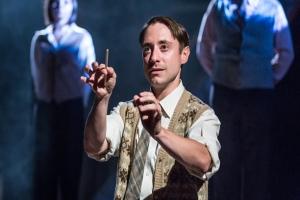Review of Britten in Brooklyn at Wilton's Music Hall
The address 7 Middagh Street in Brooklyn Heights may potentially be one of the most artistic addresses in history. Envisioned by WH Auden and George Davis, the space became an 'artist's haven' for international creative types to hide from the ever increasing tensions of the Second World War and saw personalities as varied as Pablo Picasso, Salvador Dali,Gypsy Rose Lee and Benjamin Britten reside in the dilapidated town house whilst turning their back on the world and continuing to live a hedonistic lifestyle whilst arguing about the rise of Nazi Germany and American involvement in the war.
With such a rich creative history and a variety of characters to draw from, the challenge for Zoe Lewis' charming yet oddly uneven play comes from potentially having too much ground and character to cover. There's an over-reliance on the set-up, and once this has been established we find ourselves at a brick wall and the play fails to develop past the initial exposition.
Having already been seen in theatrical form in the somewhat forgotten musical February House, Britten in Brooklyn frames the narrative as a memory play for the British composer who has deserted England to avoid conscription. For all the energy and noise that suggests an exploration of hedonism and pacifism as being the central focus of the narrative, Lewis' framing of the piece using Britten's crossing between Europe and the USA shifts the drama to focus more on his creative frustrations and his search as an artist to find himself, from the disastrous reception of his opera with Auden 'Paul Bunyan', to his 1945 work 'Peter Grimes'.
It's a play that ultimately tries to fight a war on too many fronts, and whilst there are some pleasing scenes and set pieces the overall effect is quite muddled. Lewis' language and balance between scenes is particularly strong, and she manages to capture the essence of her characters without falling into parody or caricature. We're given enough context in which to discover each of the inhabitants, who, like Gypsy Rose Lee admits, are cooped up like a "social experiment" mainly to see what happens. Too often though it feels like a tag-team of duologues as characters find contrived reasons to leave the stage, leaving the strongest scenes as back-and-forths between two characters that sit more within Lewis' comfort zone, yet when all characters are thrown together the piece rarely attempts to take off.
Whilst the personalities are questionably presented, there is a distinct fuzziness of time, and forward motion seems to be severely lacking. At times it becomes more of a character study than a drama, complete with grandstanding and overt declarations of feeling towards the war raging from total apathy to disinterest with a touch of guilt thrown in for good measure. The only drive comes late in the second act as a mysterious stranger comes to deliver Britten a notice to return home, something that never quite feels as dramatic as it should. Some uneven flashbacks to Britten's mother feel stunted and don't add anything to his development, drawing us out of the world of the house for no further gain.
The piece's greatest strength is its setting against the glorious environment of Wilton's Music Hall, where the boundaries between set and venue are practically non-existent. It's suitably atmospheric with a split level set playing to the advantages of the space, coupled with some impressive sound design by Dom James. Director Oli Rose has worked hard to find balance in the scenes, and he manages to find a rhythm for the text and an appropriate level for his actors in the unforgiving acoustics.
Ryan Sampson gives an outstanding performance as Benjamin Britten, finding the subtleties and nuances in his conflicted character that helps ground the performances of those around him. Mild mannered and finely judged in the space he draws his inner conflicts to the fore and has you hooked into his fractured psyche. He works particularly well against John Hollingworth's Auden who brings out the best in his one-sided character who is mainly reduced to quips and aphorisms, but manages to hold court successfully as a sort of de-facto leader of the pack.
Ruby Bentall delights as Carson McCullers delivering a more rounded study than her character maybe suggests on paper, and behind the glassy eyes you got a glimpse into a tortured and imaginative soul. Sadie Frost doesn't quite find the glamour of stripper Gypsy Rose Lee, but does her best with a finely sketched outline of an otherwise fascinating character used in this context to constantly play devil's advocate. As the most famous inhabitant you never understood quite what she was doing in the house aside from using it to help write a book - a dabble into a creative commune that felt consistently below her level and was never suitably explained.
Whilst on paper this seems like a creatively rich and delicious project, Lewis hasn't quite avoided the minefield that is historical drama and in many ways has failed at finding a voice for each of these overbearing personalities. For all its faults however I found myself captivated by the space and the idea behind the play, but sadly this outweighs the overall execution.
Originally published on
